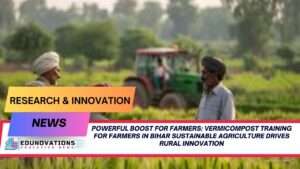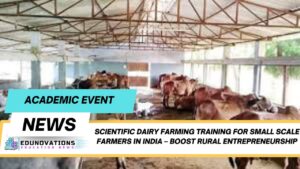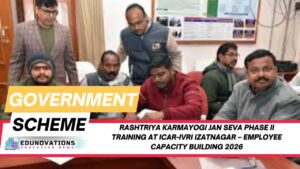Explore how value-added meat processing training for rural women by ICAR-IVRI Kolkata empowers communities through skill development, entrepreneurship, and sustainable food practices.
Introduction
In August 2025, the Eastern Regional Station of ICAR-Indian Veterinary Research Institute (IVRI), Kolkata organized a hands-on workshop focused on value-added meat processing training for rural women. This program, conducted under the Development Action Plan for Scheduled Castes (DAPSC), provided participants with knowledge and skills to create nutritious and marketable meat products. By equipping rural women with technical expertise and entrepreneurial confidence, the workshop highlighted the potential of value addition in the livestock sector to generate income and strengthen community livelihoods.
The training emphasized practical methods such as the preparation of patties, nuggets, sausages, croquettes, and meat emulsions, while also underlining hygiene, sanitation, and food safety practices. Such initiatives directly address the twin goals of empowering rural women and creating sustainable value chains in the food processing sector.
Workshop Highlights
- Hands-on Learning
Participants received live demonstrations on preparing value-added products, including meat nuggets, sausages, and croquettes. Trainers emphasized hygienic practices, proper sanitation, and safe handling of raw materials. - Focus on Utilization of Spent Hens and Low-Value Cuts
Women were taught to transform low-value or tougher cuts of meat into delicious products with high consumer appeal. This approach reduces waste and enhances profitability for rural households. - Skill Development for Entrepreneurship
Through structured guidance, participants gained exposure to small-scale machinery such as meat slicers, sausage fillers, mincers, bowl choppers, and steam cookers. These tools are affordable and accessible for rural enterprises. - Empowering Rural Women
The workshop encouraged confidence-building, ensuring that women left with both technical skills and entrepreneurial vision. By engaging in value-addition activities, they are now better positioned to enter local markets with innovative products.
Broader Impact on Rural Livelihoods
The importance of value-added meat processing training for rural women goes beyond technical knowledge. It represents a pathway to economic independence, improved nutrition, and sustainable rural development. According to data from the Ministry of Food Processing Industries, India’s meat processing sector is expected to grow at a compound annual growth rate (CAGR) of 8.5% by 2030, creating significant opportunities for micro-entrepreneurs.
When rural women actively engage in this sector, they not only boost household incomes but also contribute to food security in underserved regions. Many participants expressed eagerness to use these skills in community kitchens and cooperative ventures, ensuring broader social benefits.
Importance of Hygiene and Food Safety
An integral part of the workshop involved lessons on hygiene and sanitation. Trainers stressed that consumer trust in meat products depends heavily on food safety compliance. Participants were introduced to basic quality control measures and simple preservation techniques for shelf stability. By adhering to hygienic processing, women can produce meat items that meet both local demand and regional food safety standards.
Toppers Use Mind Maps to score more than 95%
NCERT Class 11th Commerce Mind Maps
Add to cartOriginal price was: ₹999.00.₹199.00Current price is: ₹199.00.NCERT Class 12th Chemistry Mind Maps
Add to cartOriginal price was: ₹199.00.₹75.00Current price is: ₹75.00.NCERT Class 12th Commerce Mind Maps
Add to cartOriginal price was: ₹999.00.₹199.00Current price is: ₹199.00.NCERT Class 12th Science Mind Maps
Add to cartOriginal price was: ₹999.00.₹199.00Current price is: ₹199.00.NCERT Mind Maps For Class 10th
Add to cartOriginal price was: ₹999.00.₹199.00Current price is: ₹199.00.
Purchase Today
Technical Learning Outcomes
The program included specialized modules to enhance technical understanding:
- Meat Emulsion Preparation: Demonstrations showed how to achieve uniform blends for sausages and nuggets, ensuring better taste and texture.
- Product Innovation: Women were encouraged to experiment with spices and indigenous flavors, giving their products unique market appeal.
- Shelf Stability: Trainers explained how low-moisture value-added meat products could be stored without refrigeration, an essential feature for rural areas with limited cold chain access.
This technical foundation ensures that participants are prepared not only to cook but also to innovate within their communities.
Perspectives from Experts
Dr. Pradip Kumar, a food technologist associated with IVRI, commented, “Skill development in meat processing is not just about cooking. It is about creating entrepreneurs who can transform raw resources into profitable ventures while ensuring nutrition and safety.” His statement underscores the link between scientific training and social transformation.
Similarly, nutrition expert Dr. Ritu Sharma emphasized the health benefits of balanced meat products, noting, “When women are trained in hygienic preparation, communities gain access to safer, protein-rich foods. This contributes to combating malnutrition in rural areas.”
Linking Skill Development to National Goals
The Government of India has repeatedly highlighted the role of skill development in rural empowerment. Programs like this one align with the Skill India Mission and the National Livestock Policy, which advocate entrepreneurship in animal husbandry and value addition. By focusing on how to make nuggets and patties from spent hens, the workshop addressed both sustainability and nutritional security.
For rural communities, such training provides an entry point into organized value chains. Women can now consider forming cooperatives, applying for microfinance, and leveraging schemes from the Ministry of Food Processing Industries.
Internal and External Knowledge Resources
Readers interested in related educational resources can explore:
- NCERT Courses for foundational learning.
- Current Affairs to track updates on rural empowerment schemes.
- Notes and MCQs for exam preparation.
- Videos demonstrating educational concepts.
- Syllabus and Free NCERT PDF Downloads to deepen subject knowledge.
- Mind Maps for effective study.
For institutions aiming to promote skill development in schools, external technical support is available at Mart Ind Infotech.
Future Prospects for Rural Women
The potential impact of such training is significant. With access to small-scale equipment and proper guidance, rural women can establish home-based businesses. They can market products locally, supply to eateries, or even connect with larger distribution networks. The knowledge gained from modules such as the meat emulsion preparation guide for small producers positions them to compete effectively.
Furthermore, awareness of equipment needed for value addition meat products at home ensures that participants understand both costs and opportunities. By starting small, women can gradually expand operations into profitable micro-enterprises.
Conclusion
The ICAR-IVRI Eastern Regional Station workshop serves as a prime example of how targeted skill development can transform rural livelihoods. By focusing on value-added meat processing training for rural women, it bridged gaps in knowledge, created entrepreneurial pathways, and empowered participants to envision new economic opportunities.
Such programs not only contribute to gender equality but also strengthen the rural economy. With continued investment in training and infrastructure, the dream of inclusive, sustainable food processing entrepreneurship in India is within reach.
FAQs
1. What is the main objective of value-added meat processing training for rural women?
The objective is to equip rural women with skills to prepare hygienic, marketable, and nutritious meat products, enabling entrepreneurship and income generation.
2. How does training in meat processing empower rural women?
It boosts confidence, provides technical know-how, and helps women establish small businesses.
3. What products can be made during such training programs?
Items include nuggets, sausages, patties, croquettes, and other innovative meat-based snacks.
4. Why is hygiene important in rural meat processing?
Maintaining hygiene ensures product safety, consumer trust, and compliance with food safety standards.
5. Can spent hens and low-value cuts be used in value addition?
Yes, training demonstrates how to make nuggets and patties from spent hens, turning tough cuts into palatable items.
6. What equipment is needed for value addition meat products at home?
Basic tools include a meat slicer, sausage filler, mincer, bowl chopper, and a steam cooker.
7. How do training programs ensure sustainability?
They focus on shelf-stable products and low-moisture recipes that require minimal refrigeration.
8. Is there a guide for beginners on making meat emulsions?
Yes, workshops provide a meat emulsion preparation guide for small producers.
9. How does skill development link to national programs?
It aligns with Skill India initiatives and livestock development policies for rural growth.
10. What opportunities arise after completing such training?
Participants can start local businesses, join cooperatives, or expand into larger value-added markets.














